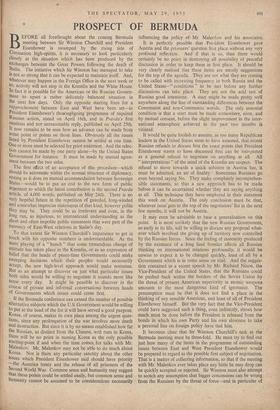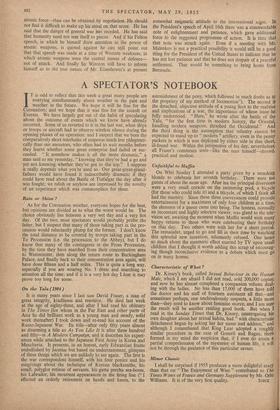• PROSPECT OF BERMUDA B EFORE all forethought about the coming
Bermuda meeting between Sir Winston Churchill and President Eisenhower is swamped by the rising tide of Coronation high-spirits, it is necessary to look particularly Closely at the situation which has been produced by the exchanges between the Great Powers following the death of Stalin. The initiative which Sir Winston has managed to take is not so strong that it can be expected to maintain itself. And, Whatever may happen in the Foreign Office in the next week or so, activity will not stop in the Kremlin and the White House. In fact it is possible for the American or the Russian Govern- ment to upset a rather delicately balanced situation in the next few days. Only the opposite starting lines for a rapprochement between East and West have been set—in President Eisenhower's thopoughgoing programme of required Russian action, stated on April 16th, and in Pravda's first cautious and not unreasonable reply, published on April 25th. It now remains to be seen how an advance can be made from some point or points on those lines. Obviously all the issues listed by President Eisenhower cannot be settled at one time. One or more must be selected for prior treatment. And the selec- tion cannot be made by one party alone—by the United States Government for instance. It must be made by mutual agree- ment between the two sides.
The first effect of an acceptance of this procedure—which Should be automatic within the 'normal structure of diplomacy, resting as it does on mutual accommodation between Sovereign States—would be to put an end to the new form of public argument to which the latest contribution is the second Pravda article, of 4,000 words, published on May 24th. There is no ver'y hopeful future in the repetition of guarded, long-winded and somewhat imprecise statements of that kind, however polite they may be. They could be as irrelevant and even, in the long run, as injurious, to international understanding as the Short and often impolite public statements that were part of the currency of East-West relations in Stalin's day.
To that extent Sir Winston Churchill's impatience to get in touch with his opposite numbers is understandable. As the mere playing of a " hunch " that some tremendous change of attitude has taken place in the Kremlin, or as an expression of belief that the heads of peace-time Governments could make sweeping decisions which their peoples would necessarily accept, the new high-level approach would make nonsense. But as an attempt to discover on just what particular issues both sides would be willing to negotiate it sounds more like sense every day. It might be possible to discover in the course of private and informal conversations between heads of Governments which issues could come first.
If the Bermuda confeeence can extend the number of possible alternative subjects which the U.S. Government would be willing to put at the head of the list it will have served a good purpose. Korea, of course, makes its own place among the urgent ques- tions, since any prolongation of the war involves more death and destruction. But since it is by no means established how far the Russian, as distinct from the Chinese, writ runs in Korea. there will be no point in naming Korea as the only possible starting-point if and when the time comes, for talks with Mr. Malenkov. Mr. Malenkov may not be able to do much about Korea. Nor is there any particular sanctity about the other issues which President Eisenhower said should have priority —the Austrian treaty and the release of all prisoners of the Second World War. Common sense and humanity may suggest that these points could be settled easily, but common sense and humanity -cannot be assumed to be considerations necessarily influencing the policy of Mr. Malenkov and his associates.
It is perfectly possible that Pre iident Eisenhower gave Austria and the prisoners' question first place without any very profound reflection. And if that is so, then there would certainly be no point in destroying all possibility of peaceful discussion in order to keep them in first place. It should be very clearly realised that these items are merely suggestions for the top of the agenda. They are not what they are coming to be called with increasing frequency in both Russia and the United States—" conditions" to be met before any further discussions can take place. They are not the acid test of Russian good intentions. A start might be made pretty well anywhere along the line of outstanding differences between the Communist and non-Communist worids. The only essential condition is that a start must be made somewhere, soon, and by mutual consent, before the slight improvement in the inter- national atmosphere achieved in the past two months is vitiated.
It would be quite foolish to assume, as too many Republican leaders in the United States seem to have assumed, that recent Russian refusals to discuss first the exact points that President Eisenhower wants to have discussed first can be interpreted as a general refusal to negotiate on anything at all. All " interpretations " of the mind of the Kremlin are suspect. The refusal to move towards a quick solution in Austria has, it must be admitted, an air of finality. Sometimes Russians go even beyond saying No. They make completely incomprehen- sible statements, so that a new approach has to be made before it can be ascertained whether they are saying anything at all. This technique they have employed in their statement this •week on Austria. The only conclusion must be that, whatever issue gets to the top of the negotiators' list in the next few months, it will not be Austria.
It may even be advisable to .base a generalisation on this point. It is most unlikely that the new Russian Government, so early in its life, will be willing, to discuss any proposal what- ever which involved the giving up of territory now controlled by the Russian forces. Since the feeling of insecurity produced by the existence of a long land frontier affects all Russian thinking on international relations profoundly; it would be unwise to expect it to be changed quickly, least of all by a Government which is in some sense on trial. And the sugges- tion contained in a recent speech by Mr. Richard Nixon, the Vice-President of the United States, that the Russians could be pushed back within the borders of the Soviet Union by the threat of present American superiority in atomic weapons amounts to the most dangerous •kind of ignorance. The presumption must be that it does not find a place in the thinking of any sensible American, and least of all of President Eisenhower himself. But the very fact that the Vice-President could have suggested such a thing, even indirectly, shows how much must be done before the President is released from the bonds in which his own Party and his own slowness to take a personal line on foreign policy have tied him.
It becomes clear that Sir Winston Churchill's task at the Bermuda meeting must be three-fold. He must try to find out just how many of the items in the programme of outstanding issues between East and West President Eisenhower would be prepared to regard as the possible first subject of negotiation. That is a matter of collecting information, so that if the meeting with Mr. Malenkov ever takes place any hints he may drop can be quickly accepted or rejected. Sir Winston must also attempt to scotch any assumption that bigger concessions can be wrung from the Russians by the threat of force—and in particular of atomic force—than can be obtained by negotiation. He should not find it difficult to make up his mind on that score. He has said that the danger of general war has receded. He has said that humanity need not tear itself to pieces. And if his Fulton speech, in which he himself drew attention to the power of atomic weapons, is quoted against he can still point out that that speech was made at a time of Western weakness, in which atomic weapons were the central means of defence— not of attack. And finally Sir Winston will have to inform himself as to the true nature of Mr. Eisenhower's at present somewhat enigmatic attitude to the international seine. In the President's speech of April 16th there was a commendable note of enlightenment and patience, which gave additional force to the suggested programme of action. It is time that that note was struck again. Even if a meeting with Mr. Malenkov is not a practical possibility it would still be a good thing for the President of the United States to indicate that he has not lost patience and that he does not despair of a peaceful settlement. That would be something to bring home from Bermuda.



































 Previous page
Previous page